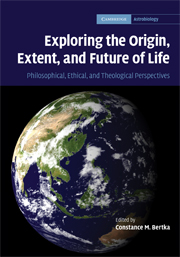 Exploring the Origin, Extent, and Future of Life
Exploring the Origin, Extent, and Future of Life Book contents
- Frontmatter
- Contents
- List of contributors
- Acknowledgements
- 1 Astrobiology in a societal context
- Part I Origin of life
- Part II Extent of life
- 7 A biologist's guide to the solar system
- 8 The quest for habitable worlds and life beyond the solar system
- 9 A historical perspective on the extent and search for life
- 10 The search for extraterrestrial life: epistemology, ethics, and worldviews
- 11 The implications of discovering extraterrestrial life: different searches, different issues
- 12 God, evolution, and astrobiology
- Part III Future of life
- Index
- References
8 - The quest for habitable worlds and life beyond the solar system
from Part II - Extent of life
Published online by Cambridge University Press: 29 December 2010
- Frontmatter
- Contents
- List of contributors
- Acknowledgements
- 1 Astrobiology in a societal context
- Part I Origin of life
- Part II Extent of life
- 7 A biologist's guide to the solar system
- 8 The quest for habitable worlds and life beyond the solar system
- 9 A historical perspective on the extent and search for life
- 10 The search for extraterrestrial life: epistemology, ethics, and worldviews
- 11 The implications of discovering extraterrestrial life: different searches, different issues
- 12 God, evolution, and astrobiology
- Part III Future of life
- Index
- References
Summary
There are infinite worlds both like and unlike this world of ours … We must believe that in all worlds there are living creatures and plants and other things we see in this world.
Epicurus (c. 300 bce)There are more things in heaven and earth, Horatio, than are dreamt of in your philosophy.
Shakespeare, Hamlet, Act I, Scene 5We shall not cease from exploration
And the end of all our exploring
Will be to arrive where we started
And know the place for the first time.
T. S. Eliot, Four QuartetsOne of the most basic questions that has been pondered by Natural Philosophers for (at least) the past few millennia concerns humanity's place in the universe: are we alone? This question has been approached from a wide variety of viewpoints, and similar reasoning has led to widely diverse answers. Aristotle believed that earth, the densest of the four elements, fell towards the center of the universe, so no other worlds could possibly exist. In contrast, Epicurus and other early atomists surmised that the ubiquity of physical laws implied that innumerable Earth-like planets must exist in the heavens.
Many aspects of the question of human uniqueness remain ill-constrained, but others have yielded to scientific investigation. Copernicus, Kepler, Galileo, and Newton convincingly demonstrated that the Earth is not the center of the universe, and that other worlds qualitatively similar to Earth orbit the Sun. Telescopic observations, and more recently interplanetary spacecraft, have told us a great deal about these neighboring worlds.
- Type
- Chapter
- Information
- Exploring the Origin, Extent, and Future of LifePhilosophical, Ethical and Theological Perspectives, pp. 143 - 166Publisher: Cambridge University PressPrint publication year: 2009
References
- 1
- Cited by
